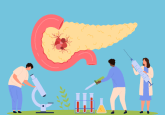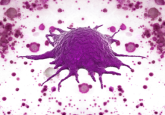Could drinking carbon monoxide foam suppress tumor cell growth?

Scientists have developed a drinkable, carbon monoxide-infused foam that impacts autophagy in cancerous cells, leading to reduced cellular tumor volumes.
Autophagy is a natural process whereby cells recycle their contents. This process plays an important role in cellular survival and is amplified in cancerous cells, which led academics to explore modulating the process for treating tumors.
Researchers have previously demonstrated that carbon monoxide, a gas found in higher concentrations in smokers, induces autophagy in healthy cells through increasing mitochondrial reactive oxygen species.
Using retrospective data from clinical trials, the team made a surprising discovery that smoking status is directly correlated with a positive response to autophagy inhibitors. “We saw an increase in overall response in smokers that received the autophagy inhibitors, compared to (non-smoker) patients, and we also saw a pretty robust decrease in the target lesion size,” explained senior author James Byrne (University of Iowa, IA, USA).
“We know also that smokers have higher carbon monoxide levels and while we definitely don’t recommend smoking, this suggested that elevated carbon monoxide might improve the effectiveness of autophagy inhibitors. We want to be able to harness that benefit and take it into a therapeutic platform,” Byrne added.
 Breathe easy: how inhalable nanosensors could enhance lung cancer diagnostics
Breathe easy: how inhalable nanosensors could enhance lung cancer diagnostics
Researchers from various faculties at MIT have designed inhalable nanosensors for the detection of lung cancer.
To capitalize on this, the researchers took inspiration from the gadgets in the world of molecular gastronomy to develop a drinkable foam that comprised carbon monoxide gas-entrapping materials (GeMs). Using commercially available whipping siphons and through the process of reverse engineering the team were able to introduce specific concentrations of carbon monoxide within the GeM matrix.
First, they demonstrated that in mice and pigs the delivery of carbon monoxide by GeMs was effective. Next, they showed in human and mouse prostate, pancreatic and lung cancer cell lines that carbon monoxide both induced autophagy and enhanced the anti-cancer effects of autophagy inhibitors.
The team went on to investigate whether their carbon monoxide-infused foam suppressed tumor growth. By studying mouse models of prostate and pancreatic cancer, they demonstrated that the combination of carbon monoxide GeMs with the autophagy inhibitor (termed hydroxychloroquine) resulted in tumor growth inhibition.
The team hope that their approach will be applicable to a wide variety of malignancies and that – due to the anti-inflammatory properties of carbon monoxide – it may also be helpful as a concurrent therapy for radiation therapy, which generally leads to tissue injury. The researchers’ ultimate goal would be to conduct a human clinical trial of their drinkable foam.





